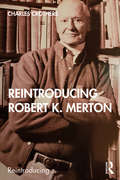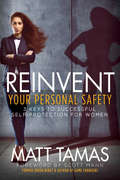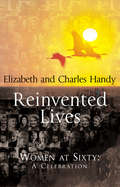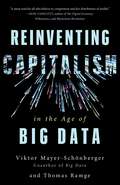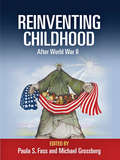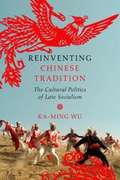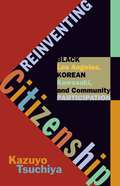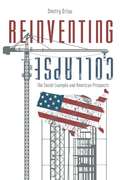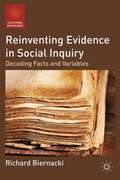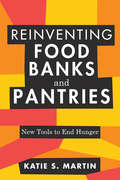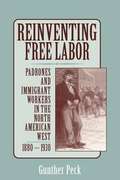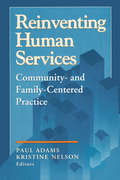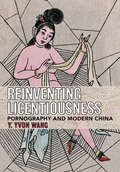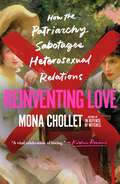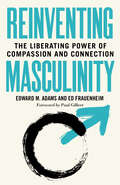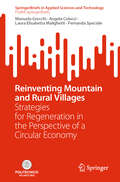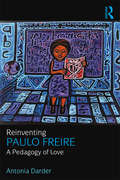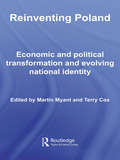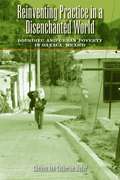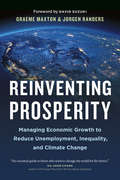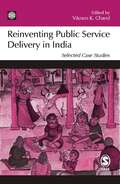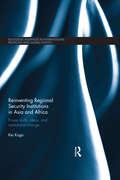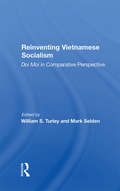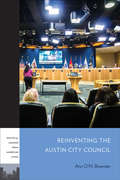- Table View
- List View
Reintroducing Robert K. Merton (Reintroducing...)
by Charles CrothersThis book reintroduces the work of Robert K. Merton as a bridge between classical sociology and modern sociology. Founded in the sociological classics but developing a modern approach to the advancement of theory and research methodology, Merton’s thought helped to construct modern sociology in its coverage of many of the social institutional areas of contemporary society. Recovering and analysing the system of ‘structural analysis’ which Merton progressively developed – a system largely overlooked due to the tendency among commentators to stereotype him as a ‘functionalist’ – the author considers the applications of this approach to various substantive fields, particularly science and criminal justice, and examines the effect of Merton’s later ‘sociological semantics’ on his overall schema. A clear and accessible presentation of the array of concepts introduced by Merton to sociology, Reintroducing Robert K. Merton will appeal to scholars and students with interests in sociological theory, social research, the history of sociology and the various substantive areas covered in the work of Merton – deviance, science, and communications.
Reinvent Your Personal Safety: 3 Keys to Successful Self-Protection for Women
by Matt TamasIn Reinvent Your Personal Safety, Matt Tamas takes women through a proactive approach to personal safety, one that isn’t about honing technical moves or perfecting technique, but more about showing them how to work with their own body and mind, considering realistic scenarios, and training them to take appropriate action. Matt’s job, as a personal safety coach, is to not only give women the tools to fight back during an assault, but also to help them prevent themselves from being assaulted in the first place. The right action to take is often in advance of a likely violent encounter in order to avoid it altogether. The best way to protect one’s self is avoiding the situation in which she is forced to defend herself. Reinvent Your Personal Safety talks about the different ways this is possible, as well as about the best way to handle one’s self when violent confrontation simply cannot be avoided. This is for the high-school girl, for the grandmother, for the young professional, for the working mother – anyone who is willing to overcome their limiting beliefs about what they’re capable of and key into what self-protection is really about. In reality, knowledge of the appropriate action to take in any given situation is worth scores more than athleticism.
Reinvented Lives: Women at Sixty: A Celebration
by Charles Handy Elizabeth HandyTwenty-eight women, ranging from Anita Roddick and Prue Leith to less well-known names, write their own personal stories which are accompanied by Elizabeth Handy's black and white photographs and an introductory essay by Charles Handy. This generation of women is entering the sixties more healthy, more educated and more energetic than most of their mothers. The subjects in this book provide the models for what has become, for the first time, a new age for many women. Released from most of the cares and responsibilities that accompany midlife for women, they are free to reinvent themselves, to give more time to their career or calling, or to luxuriate in the serenity and friendships that few had time for in the past. Some enter new relationships, some start new careers or go back to study, some find that their work is only now reaching its peak. Many have survived traumas and tragedies, but 'the past is just the prologue' as one of them explains.
Reinventing Brantford: A University Comes Downtown
by Leo GroarkeShort-listed for the 2012 Speaker’s Award One hundred years ago, the City of Brantford advertised itself as the most important manufacturing centre in Canada. During the century that followed, its industrial economy boomed, faltered, and finally collapsed. By the end of the twentieth century, Brantford was known for unemployment, hard luck, and the infamy of having "the worst downtown in Canada." For twenty years the downtown was in steep decline. Significant attempts at urban revival had failed until Wilfrid Laurier University decided to locate a campus in the heart of Brantford’s crumbling city centre. Leo Groarke revisists the grandeur of the city’s past, explores the economic downfall, and tells the story of the arrival of the university, its early struggles, its commitment to historic restoration, and its ultimate success as a catalyst for urban renewal. The compelling story he recounts will engage anyone interested in the plight of the North-American city core and the role that universities and colleges can play in re-establishing downtowns as vibrant centres of historical and contemporary importance.
Reinventing Capitalism in the Age of Big Data
by Viktor Mayer-Schönberger Thomas RamgeFrom the New York Times bestselling author of Big Data, a prediction for how data will revolutionize the market economy and make cash, banks, and big companies obsoleteIn modern history, the story of capitalism has been a story of firms and financiers. That's all going to change thanks to the Big Data revolution. As Viktor Mayer-Schönberger, bestselling author of Big Data, and Thomas Ramge, who writes for The Economist, show, data is replacing money as the driver of market behavior. Big finance and big companies will be replaced by small groups and individual actors who make markets instead of making things: think Uber instead of Ford, or Airbnb instead of Hyatt.This is the dawn of the era of data capitalism. Will it be an age of prosperity or of calamity? This book provides the indispensable roadmap for securing a better future.
Reinventing Childhood After World War II
by Paula S. Fass Michael GrossbergIn the Western world, the modern view of childhood as a space protected from broader adult society first became a dominant social vision during the nineteenth century. Many of the West's sharpest portrayals of children in literature and the arts emerged at that time in both Europe and the United States and continue to organize our perceptions and sensibilities to this day. But that childhood is now being recreated.Many social and political developments since the end of the World War II have fundamentally altered the lives children lead and are now beginning to transform conceptions of childhood. Reinventing Childhood After World War II brings together seven prominent historians of modern childhood to identify precisely what has changed in children's lives and why. Topics range from youth culture to children's rights; from changing definitions of age to nontraditional families; from parenting styles to how American experiences compare with those of the rest of the Western world. Taken together, the essays argue that children's experiences have changed in such dramatic and important ways since 1945 that parents, other adults, and girls and boys themselves have had to reinvent almost every aspect of childhood.Reinventing Childhood After World War II presents a striking interpretation of the nature and status of childhood that will be essential to students and scholars of childhood, as well as policy makers, educators, parents, and all those concerned with the lives of children in the world today.
Reinventing Chinese Tradition: The Cultural Politics of Late Socialism
by Ka-Ming WuThe final destination of the Long March and center of the Chinese Communist Party's red bases, Yan'an acquired mythical status during the Maoist era. Though the city's significance as an emblem of revolutionary heroism has faded, today's Chinese still glorify Yan'an as a sanctuary for ancient cultural traditions. Ka-ming Wu's ethnographic account of contemporary Yan'an documents how people have reworked the revival of three rural practices--paper-cutting, folk storytelling, and spirit cults--within (and beyond) the socialist legacy. Moving beyond dominant views of Yan'an folk culture as a tool of revolution or object of market reform, Wu reveals how cultural traditions become battlegrounds where conflicts among the state, market forces, and intellectuals in search of an authentic China play out. At the same time, she shows these emerging new dynamics in the light of the ways rural residents make sense of rapid social change. Alive with details, Reinventing Chinese Tradition is an in-depth, eye-opening study of an evolving culture and society within contemporary China.
Reinventing Citizenship: Black Los Angeles, Korean Kawasaki, and Community Participation (Critical American Studies)
by Kazuyo TsuchiyaIn the 1960s and 1970s, the United States and Japan went through massive welfare expansions that sparked debates about citizenship. At the heart of these disputes stood African Americans and Koreans. Reinventing Citizenship offers a comparative study of African American welfare activism in Los Angeles and Koreans&’ campaigns for welfare rights in Kawasaki. In working-class and poor neighborhoods in both locations, African Americans and Koreans sought not only to be recognized as citizens but also to become legitimate constituting members of communities.Local activists in Los Angeles and Kawasaki ardently challenged the welfare institutions. By creating opposition movements and voicing alternative visions of citizenship, African American leaders, Tsuchiya argues, turned Lyndon B. Johnson&’s War on Poverty into a battle for equality. Koreans countered the city&’s and the nation&’s exclusionary policies and asserted their welfare rights. Tsuchiya&’s work exemplifies transnational antiracist networking, showing how black religious leaders traveled to Japan to meet Christian Korean activists and to provide counsel for their own struggles.Reinventing Citizenship reveals how race and citizenship transform as they cross countries and continents. By documenting the interconnected histories of African Americans and Koreans in Japan, Tsuchiya enables us to rethink present ideas of community and belonging.
Reinventing Collapse
by Dmitry OrlovThis new edition of Reinventing Collapse is an update on the growing similarities and differences between the collapse of the Soviet Union and the current unraveling of the United States. With sharp wit and dry humor, Dmitry Orlov shares his personal experiences in post-industrial living and argues that US collapse is survivable given the right attitude and preparation.
Reinventing Evidence In Social Inquiry
by Richard BiernackiRevisiting the dominant scientific method, 'coding,' with which investigators from sociology to literary criticism have sampled texts and catalogued their cultural messages, the author demonstrates that the celebrated hard outputs rest on misleading samples and on unfeasible classifying of the texts' meanings.
Reinventing Food Banks and Pantries: New Tools to End Hunger
by Katie S. MartinIn the US, there is a wide-ranging network of at least 370 food banks, and more than 60,000 hunger-relief organizations such as food pantries and meal programs. These groups provide billions of meals a year to people in need. And yet hunger still affects one in nine Americans. What are we doing wrong?In Reinventing Food Banks and Pantries, Katie Martin argues that if handing out more and more food was the answer, we would have solved the problem of hunger decades ago. Martin instead presents a new model for charitable food, one where success is measured not by pounds of food distributed but by lives changed. The key is to focus on the root causes of hunger. When we shift our attention to strategies that build empathy, equity, and political will, we can implement real solutions. Martin shares those solutions in a warm, engaging style, with simple steps that anyone working or volunteering at a food bank or pantry can take today. Some are short-term strategies to create a more dignified experience for food pantry clients: providing client choice, where individuals select their own food, or redesigning a waiting room with better seating and a designated greeter. Some are longer-term: increasing the supply of healthy food, offering job training programs, or connecting clients to other social services. And some are big picture: joining the fight for living wages and a stronger social safety net.These strategies are illustrated through inspiring success stories and backed up by scientific research. Throughout, readers will find a wealth of proven ideas to make their charitable food organizations more empathetic and more effective. As Martin writes, it takes more than food to end hunger. Picking up this insightful, lively book is a great first step.
Reinventing Free Labor: Padrones and Immigrant Workers in the North American West, 1880-1930
by Gunther PeckOne of the most infamous villains in North America during the Progressive Era was the padrone, a mafia-like immigrant boss who allegedly enslaved his compatriots and kept them uncivilized, unmanly, and unfree. In this first-ever history of the padrone, Gunther Peck argues that they were not primitive men but rather thoroughly modern entrepreneurs who used corporations, the labor contract, and the right to quit to create far-flung coercive networks. Drawing on Greek, Spanish, and Italian language sources, Peck analyzes how immigrant workers emancipated themselves using the tools of padrone power to their own advantage.
Reinventing Human Services: Community- and Family-Centered Practice (Modern Applications Of Social Work Ser.)
by Benjamin HigginsDissatisfaction with a human services system that is unresponsive, stigmatizing, and ineffective has led to a ferment of experimentation in recent years. Reinventing Human Services examines the historical and economic context of current efforts to reinvent human services, showing the urgency and the difficulty of the task. It draws on successful examples in Britain, Canada, and the United States to develop a new paradigm for social work practice, one that integrates individual, family, and community levels of practice and reconceptualizes professional-community relations. The interdisciplinary team of authors includes scholars, researchers, and practitioners from the disciplines of economics, urban planning, communications, criminal justice, psychology, marriage and family therapy, education, and social work.
Reinventing Licentiousness: Pornography and Modern China
by Y. Yvon WangReinventing Licentiousness navigates an overlooked history of representation during the transition from the Qing Empire to the Chinese Republic—a time when older, hierarchical notions of licentiousness were overlaid by a new, pornographic regime. Y. Yvon Wang draws on previously untapped archives—ranging from police archives and surveys to ephemeral texts and pictures—to argue that pornography in China represents a unique configuration of power and desire that both reflects and shapes historical processes. On the one hand, since the late imperial period, pornography has democratized pleasure in China and opened up new possibilities of imagining desire. On the other, ongoing controversies over its definition and control show how the regulatory ideas of premodern cultural politics and the popular products of early modern cultural markets have contoured the globalized world.Reinventing Licentiousness emphasizes the material factors, particularly at the grassroots level of consumption and trade, that governed "proper" sexual desire and led to ideological shifts around the definition of pornography. By linking the past to the present and beyond, Wang's social and intellectual history showcases circulated pornographic material as a motor for cultural change. The result is an astonishing foray into what historicizing pornography can mean for our understandings of desire, legitimacy, capitalism, and culture.
Reinventing Love: How the Patriarchy Sabotages Heterosexual Relations
by Mona CholletA new work by the author of “In Defense of Witches” that seeks to redefine heterosexual relationships and give women back their voice.As feminist principles have taken wider hold in society, and basic ideas about equality for women can seem a given, many women still struggle in one of the most important areas of life: love. Whether it’s finding a partner, seeking a commitment from one, or struggling in a relationship that is unfulfilling or even potentially abusive, women still find that deeply-engrained notions of gender and behavior can be obstacles to a healthy, loving relationship. In her new book, acclaimed French feminist Mona Chollet tackles some of these long-held and pervasive ideas that remain stumbling blocks for many women in heterosexual relationships.Drawing from popular culture, politics, and literature, Reinventing Love provides a provocative, accessible look at how heterosexual relationships can improve and evolve under a feminist lens.
Reinventing Masculinity: The Liberating Power of Compassion and Connection
by Ed Frauenheim Ed AdamsA wonderful book for thinking about how to release ourselves from crippling processes. It's time for men-and for all of us-to stand up and say, Give us back our full humanity, give us back our dignity.'-Paul Gilbert, PhD, author of The Compassionate Mind In a recent FiveThirtyEight poll, 60 percent of men surveyed said society puts pressure on men to behave in a way that is unhealthy or bad. Men account for 80 percent of suicides in the United States, and three in ten American men have suffered from depression. Ed Adams and Ed Frauenheim say a big part of the problem is a model of masculinity that's become outmoded and even dangerous, to both men and women. The conventional notion of what it means to be a man-what Adams and Frauenheim call Confined Masculinity-traps men in an emotional straitjacket; steers them toward selfishness, misogyny, and violence; and severely limits their possibilities. As an antidote, they propose a new paradigm: Liberating Masculinity. It builds on traditional masculine roles like the protector and provider, expanding men's options to include caring, collaboration, emotional expressivity, an inclusive spirit, and environmental stewardship. Through hopeful stories of men who have freed themselves from the strictures of Confined Masculinity, interviews with both leaders and everyday men, and practical exercises, this book shows the power of a masculinity defined by what the authors call the five Cs: curiosity, courage, compassion, connection, and commitment. Men will discover a way of being that fosters healthy, harmonious relationships at home, at work, and in the world.
Reinventing Mountain and Rural Villages: Strategies for Regeneration in the Perspective of a Circular Economy (SpringerBriefs in Applied Sciences and Technology)
by Angela Colucci Manuela Grecchi Laura Elisabetta Malighetti Fernanda SpecialeThis book explores problems generated by the abandonment of mountain villages, which also represented strategic sites for guarding against environmental hazards, and proposes a process of regeneration and upgrade of the built environment, with a view to a circular economy and social and economic development. It provides principles, methods, and tools supporting the design and management of the regeneration of abandoned mountain/rural villages and presents the transferable results of multidisciplinary applied research involving several local contexts and compares methodological and technical design solutions developed in successful practices. The book consists of six chapters that address specific issues in the regeneration process of depopulated mountain villages.
Reinventing Paulo Freire
by Antonia DarderOne of the most influential critical educators of the twentieth century, Paulo Freire challenged those educational inequalities and conditions of injustice faced by oppressed populations. In this new edition of Reinventing Paulo Freire, Antonia Darder re-examines his legacy through reflections on Freirean pedagogy and the narratives of teachers who reinvent his work. The fully revised first part provides important historical, political, and economic connections between major societal concerns and educational questions raised by Freire and their link to the contemporary moment, including questions tied to neoliberalism, coloniality, and educational inequalities. At the heart of the book is a critical understanding of how Freire#65533;s pedagogy of love can inform, in theory and practice, a humanizing approach to teaching and learning. Powerful teacher narratives offer examples of a living praxis, committed to democratic classroom life and the emancipation of subaltern communities. The narratives clearly illustrate how Freire#65533;s ideas can be put concretely into practice in schools and communities. These reflections on Freirean praxis are sure to spark conversation and inspiration in teacher education courses. Through a close theoretical engagement of Freire#65533;s ideas and key insights garnered from lived experiences, the book speaks to the ways Freire can still inspire contemporary educators to adopt the spirit of#65533;liberatory pedagogy, By so doing, Reinventing Paulo Freire is certain to advance his theories in new ways, both to those familiar with his work and to those studying Freire for the first time.
Reinventing Poland: Economic and Political Transformation and Evolving National Identity (BASEES/Routledge Series on Russian and East European Studies)
by Martin Myant Terry CoxThe end of communism and accession to the European Union have had a huge impact on Poland. This book provides an overall assessment of the post-1989 transformation in Poland. It focuses in particular on four key themes: economic transformation and its outcomes; the heritage of the past and national identity; regional development in Poland including the implications of EU accession for regional development; and political developments both before and after EU accession. In addition the book shows how changes in all these areas are related, and emphasises the overall common themes. The book is in memory of George Blazyca, of the University of Paisley, whose work on the political economy of transition in Poland is highly regarded, and who did a great deal to support the work of Polish academic colleagues and to promote the work of young scholars.
Reinventing Practice in a Disenchanted World
by Cheleen Ann-Catherine MaharColonia Hermosa, now considered a suburb of Oaxaca, began as a squatter settlement in the 1950s. The original residents came in search of transformation from migrants to urban citizens, struggling from rural poverty for the chance to be part of the global economy in Oaxaca. Cheleen Ann-Catherine Mahar charts the lives of a group of residents in Colonia Hermosa over a period of thirty years, as Mexico became more closely tied into the structures of global capital, and the residents of Colonia Hermosa struggled to survive. Residents shape their discussions within a larger narrative, and their talk is the language of the heroic individual, so necessary to the ideology and the functioning of capital. However, this logic only tenuously connects to the actual material circumstances of their lives. Mahar applies the theories of French sociologist Pierre Bourdieu to her data from Mexico in order to examine the class trajectories of migrant families over more than three decades. Through this investigation, Mahar adds an important intergenerational study to the existing body of literature on Oaxaca, particularly concerning the factors that have reshaped the lives of urban working poor families and have created a working-class fraction of globalized citizenship.
Reinventing Prosperity: Managing Economic Growth to Reduce Unemployment, Inequality, and Climate Change
by Jorgen Randers Graeme Maxton&“An important contribution to the global debate about growth, equality, climate change, and the path to a viable human future.&” —David Korten, international bestselling author of When Corporations Rule the World The biggest challenges facing human wellbeing today—widening income inequality, continuing global poverty, and environmental degradation—may be simple to solve in theory. But, because we are required to come up with solutions that are acceptable to a political majority in the rich world, they are much harder to solve in practice. Most of the commonly proposed &“solutions&” are simply not acceptable to most people. Many of these proposed solutions—like stopping the use of fossil fuels—require a sacrifice today in order to obtain an uncertain advantage in the far future. Therefore they are politically infeasible in the modern world, which is marked by relatively short term thinking. In Reinventing Prosperity, Graeme Maxton and Jorgen Randers provide a new approach altogether through thirteen recommendations which are both politically acceptable and which can be implemented in the current period of slow economic growth around the world. Reinventing Prosperity solves the forty-year-old growth/no-growth standoff, by providing a solution to income inequality, continuing global poverty and climate change, a solution that will provide for economic growth but with a declining ecological footprint.Reinventing Prosperity shows us how to live better on our finite planet—and in ways we can agree on. &“An essential guide to those who want to change the world for the better—and for certain.&” —Ha-Joon Chang, international bestselling author of 23 Things They Don&’t Tell You About Capitalism &“[A] well-argued book . . . explaining complex issues in a style that is clear, logical, and succinct.&” —Publishers Weekly
Reinventing Public Service Delivery in India: Selected Case Studies
by Vikram K. ChandThis volume focuses on sucessful cases of innovative change in public service delivery and offers comment on initatives to continue change and further develop best practice.
Reinventing Regional Security Institutions in Asia and Africa: Power shifts, ideas, and institutional change (Routledge Advances in International Relations and Global Politics)
by Kei KogaRegional security institutions play a significant role in shaping the behavior of existing and rising regional powers by nurturing security norms and rules, monitoring state activities, and sometimes imposing sanctions, thereby formulating the configuration of regional security dynamics. Yet, their security roles and influence do not remain constant. Their raison d’etre, objectives, and functions experience sporadic changes, and some institutions upgrade military functions for peacekeeping operations, while others limit their functions to political and security dialogues. The question is: why and how do these variances in institutional change emerge? This book explores the mechanisms of institutional change, focusing on regional security institutions led by non-great powers. It constructs a theoretical model for institutional change that provides a new understanding of their changing roles in regional security, which has yet to be fully explored in the International Relations field. In so doing, the book illuminates why, when, and how each organization restructures its role, function, and influence. Using case studies of the Association of Southeast Asian Nations (ASEAN), the Economic Community of West African States (ECOWAS), and the Organization of African Unity (OAU)/ African Union (AU), it also sheds light on similarities and differences in institutional change between regional security institutions.
Reinventing Vietnamese Socialism: Doi Moi In Comparative Perspective
by Mark Selden William S TurleyThis book presents a variety of disciplinary and theoretical perspectives on the problematic of reform in Vietnam. It explores the Vietnam's reforms in relation to those taking place in other countries of the socialist world, comparing doi moi with restructuring in other socialist states.
Reinventing the Austin City Council (PLAC: Political Lessons from American Cities)
by Ann O'M. BowmanUntil recently, Austin, the progressive, politically liberal capital of Texas, elected its city council using a not-so-progressive system. Candidates competed citywide for seats, and voters could cast ballots for as many candidates as there were seats up for election. However, this approach disadvantages the representation of geographically-concentrated minority groups, thereby—among other things—preventing the benefits of growth from reaching all of the city’s communities. Reinventing the Austin City Council explores the puzzle that was Austin’s reluctance to alter its at-large system and establish a geographically-based, single-member district system. Ann Bowman chronicles the repeated attempts to change the system, the eventual decision to do so, and the consequences of that change. In the process, she explores the many twists and turns that occurred in Austin as it struggled to design a fair system of representation. Reinventing the Austin City Council assesses the impact of the new district system since its inception in 2014. Austin’s experience ultimately offers a political lesson for creating institutional change.
